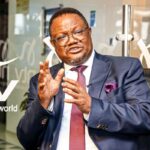The Democratic Republic of the Congo (DRC) is taking decisive steps to assert control over its vast mineral resources, seeking a more balanced relationship with global powers.
In a bold policy shift, President Félix Tshisekedi suspended cobalt exports for four months starting in February 2025, citing the need to secure fair pricing and reassess existing trade arrangements.
According to a report published today, June 9, 2025, by El País, Tshisekedi’s administration is actively pursuing a “minerals-for-security” partnership with the United States. The proposed deal would allow American companies greater access to Congo’s strategic minerals in exchange for increased security support and infrastructure investments.
Currently, the DRC supplies over 70% of the world’s cobalt, a critical element in manufacturing electric vehicle (EV) batteries, smartphones, and renewable energy storage systems. The suspension of exports was designed to challenge the longstanding dominance of Chinese firms, particularly China Molybdenum Company (CMOC), which co-owns the vast Tenke Fungurume Mine.
This strategy reflects Kinshasa’s broader goal of shifting away from a model in which it merely extracts and exports raw materials without reaping meaningful national benefits. “It is time Congo gains not just revenue, but real influence from its mineral wealth,” a senior government advisor told local media.
Parallel to these developments, the U.S. government is re-evaluating its critical minerals strategy. In light of mounting geopolitical tensions with China, Washington sees Africa—and Congo in particular—as a key partner in securing alternative supply routes for rare earth elements and battery metals.
There are also security considerations. Eastern Congo remains volatile, plagued by militia activity, notably the resurgence of the M23 rebel group, which continues to destabilize parts of North Kivu. The U.S. may offer military training, surveillance support, and investment in regional stabilization in exchange for mining rights.
Also Read; Kenya Confirms 25 Chikungunya Cases in Mombasa
This approach resembles earlier infrastructure-for-resources deals seen in Africa—but Congo insists it will not repeat past mistakes. Transparency and national benefit are central pillars of this emerging strategy.
New players are also watching closely. KoBold Metals, a U.S.-backed mining tech firm with investors like Bill Gates and Jeff Bezos, has already expressed interest in conducting sustainable exploration projects in the DRC.
While Tshisekedi emphasizes that Congo is not abandoning China, the shift toward a multi-aligned mineral diplomacy reflects a larger transformation. “We are diversifying—not disconnecting,” a Kinshasa-based official noted. “No single country should dictate our destiny.”
Beijing, for its part, has expressed concern. Analysts predict that any prolonged halt in cobalt exports could ripple through the global EV supply chain, disrupting manufacturers from Tesla to BYD.
The export freeze is scheduled to expire on June 22, but many expect Congo to either extend the ban or announce new regulatory measures, depending on the status of ongoing negotiations.
In the race for clean energy and tech dominance, Congo has become more than just a resource hub—it has become a strategic chessboard where global powers are recalibrating influence. And this time, Kinshasa is determined to play the game on its own terms.







